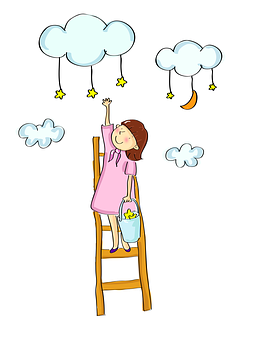 Most of us realise that achieving our goals is not always plain sailing. We’ll definitely experience setbacks and have to figure out how to overcome these to move forwards and we’ll certainly feel like pulling the duvet over our heads and giving up on occasion. But, when we’re passionate about something, we know that the hard work and sacrifice is worthwhile and this helps us to push on to achieve our dreams.
Most of us realise that achieving our goals is not always plain sailing. We’ll definitely experience setbacks and have to figure out how to overcome these to move forwards and we’ll certainly feel like pulling the duvet over our heads and giving up on occasion. But, when we’re passionate about something, we know that the hard work and sacrifice is worthwhile and this helps us to push on to achieve our dreams.
However, I was reading an interesting piece of research recently (Miller & Wrosh, 2007) that warns against too much struggling. This is because, they say, working on unrealistic goals, which can’t be achieved or show no positive progress, is bad for us - mentally, physically and emotionally – causing side effects such as increases in C-reactive proteins, a mark of systemic inflammation and a major cause of burnout, chronic fatigue and even ME in extreme cases.
This suggestion resonated with me because, while I’m willing to put my all into achieving what I want and living up to my commitments, like most people, I’ve had times when I’ve felt like the mouse on the wheel, always running but getting nowhere. This came with a number of negative consequences too including lack of concentration, less resolve and ability to find solutions and, eventually, sickening fatigue.
So, to ensure that you remain in the best nick for your goal-getting journey, it’s helpful to review your goals on a regular basis and think about the following:
Do I truly want to achieve this goal?
Sometimes we set ourselves a goal that we think we should achieve, maybe something that others have suggested or are doing. But, when we re-consider the goal, we realise that it doesn’t feel authentic and, actually, we’re just not that interested in it.
If this is the case, it’s probably time to drop the goal in question. You may not be able to do this immediately and longer-term planning might be involved. However, if you’ve dis-engaged from a goal and feel little or no genuine enthusiasm for it, it will be much harder to achieve and you’ll feel much less fulfilment in the process and the end result… no matter how good it looks on paper.
Also, it’s exhausting and joyless putting huge amounts of effort into something that you’ve no stomach for resulting in less energy and determination to face hurdles and setbacks…much better to concentrate on something that has real value to you.
Am I still passionate about this goal?
“Find a job that you enjoy doing, and you will never have to work a day in your life,” said Mark Twain. Don’t you just love that feeling when the day speeds by and you haven’t noticed the time because you’ve been so absorbed with and delighted by your work? One of the great things about working in the creative industries is that, when it’s going right, it’s just sooooooo right.
However, even if you love your work, there will be times when you need to draw on your strength and resilience to stare down adversity. If you’re enthusiastic and believe in what you do, you’ll be much more able to dig deep when you need to.
Remember, there’s no shame in admitting that you’ve lost the taste for a particular area. It’s human nature to get bored and maybe you need to explore new avenues, develop new skills and experience the thrill of the unknown again. While change may take courage and consistent effort, it takes a far greater toll to continue to do something that just doesn’t spark your interest anymore.
Am I trying to achieve too much?
Personally, I thrive on a varied range of activities but, to my great relief, I crossed a couple of goals off my list recently. OK, I may want to achieve them one day… but I realised that they obviously weren’t a priority otherwise I would have done them by now.
While it’s often exciting and motivating to have several goals on the boil at once, if you’re working on too many, it can be overwhelming and damage your ability to focus on what you truly need and want to do.
I found it liberating to make a positive decision to re-prioritise my goals and throw out the ones that have been hanging around on my ‘to do’ list without any real attention. Now, these interlopers are no longer lurking in the wings making me feel guilty about what I should have done and this allows me to concentrate fully on what I am doing.
From the range of research I’ve done and my own experience, the art of success and satisfaction seems to be knowing when to try, try and try again until you succeed and when, for whatever reason, to drop something so that you can free yourself up to concentrate on the things that will be much more rewarding. Or, as Miller & Wrosh put it, to avoid struggling too much and disengage before it gets too serious.
More info
- For more on goal setting catch up with our webinar recording.
- Sign up to FEU Training’s e-course Overcoming Freelance Challenges.
